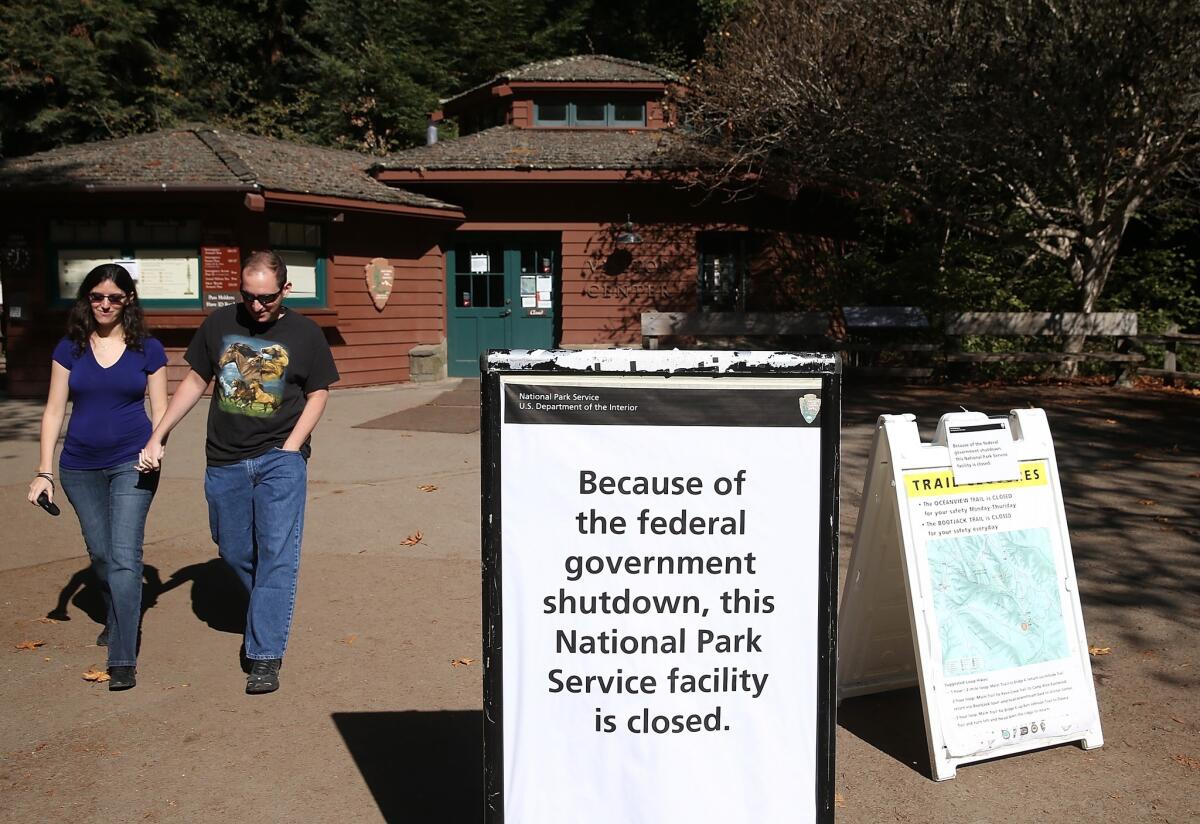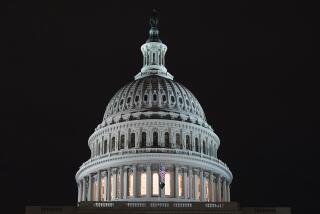Looming debt-ceiling fight complicates government shutdown

You could see this one coming.
Politico reported late Tuesday that congressional leaders are starting to talk about two fiscal crises merging in the days ahead. Federal agencies have partially shut down because House Republicans refuse to pass a bill to keep them open unless Senate Democrats agreed to delay or derail the 2010 healthcare law they (and President Obama) strongly support. The more time Congress spends debating this shutdown, the closer the federal government comes to hitting the debt ceiling -- a limit that Treasury Secretary Jacob Lew says will be reached around Oct. 17.
The end of the fiscal year Sept. 30 and the deadline for raising the debt ceiling once seemed far enough apart for Republicans to take two bites at the fiscal apple. They could use the threat of a government shutdown on Oct. 1 to seek concessions on discretionary spending, then the threat of a default to seek concessions on other issues related to the deficit -- for example, an agreement on tax reform or slowing the growth of entitlements.
FULL COVERAGE: The government shutdown
The GOP’s tea party wing changed the calculus dramatically, however, by demanding that the government-funding continuing resolution be held hostage until the Affordable Care Act (better known as Obamacare) was “defunded,” delayed or scaled back in some way. That demand has proved to be such a show-stopper, it may take days or weeks to resolve the impasse over the stopgap funding bill. And the more time passes, the more reluctant Democrats may be to accept any deal that doesn’t raise the debt ceiling as well.
That may be one of the reasons Obama summoned congressional leaders to the White House on Wednesday evening for ... it’s not clear what, exactly. The administration says Obama won’t negotiate; he just wants to reiterate his wish for Congress to pass a simple stopgap funding bill to reopen the shuttered agencies.
Merging the funding bill with the debt limit increase could push the two sides further apart, given that House Speaker John Boehner (R-Ohio) has insisted that any increase in the debt ceiling be accompanied by steps to reduce projected deficits. On the other hand, the fiscal issues are essentially the same in both cases: how much do lawmakers want to reduce the deficit, and how do they want to do it?
One key to any deal will be resolving the differences between the two chambers over the “sequester” cuts required by the 2011 Budget Control Act. Neither side likes the sequester, but for very different reasons: Republicans want smaller cuts at the Pentagon, and Democrats want to replace the cuts to domestic programs by trimming some entitlements and eliminating some corporate tax breaks.
The X factor is the tea party wing of the GOP and its insistance that something be done about the Affordable Care Act. Although Obama insists that it’s a purely ideological attack that doesn’t belong in the discussions, it fits into the GOP’s broader argument that Washington has to rein in entitlement spending to balance its budget and halt the growth of the national debt. Still, the fate of the healthcare law wasn’t a central issue in the last two, fiercely contentious budget negotiations: the “fiscal cliff” talks in late 2012 and the debt-ceiling debate in mid-2011.
Senate Majority Leader Harry Reid (D-Nev.) wrote Boehner on Wednesday, offering to empanel a conference committee on the fiscal 2014 budget in which negotiators could make proposals about healthcare, tax reform and any other issue they felt appropriate. His one precondition was the House passing a temporary funding bill with no contentious riders attached. But Senate Democrats have been trying to go to conference on the budget since March, only to be rebuffed by House Republicans eager to use the leverage that the end of the fiscal year and the debt ceiling would provide.
Had Boehner or House Budget Committee Chairman Paul Ryan (R-Wis.) known six months ago that the House would use all that leverage to take on the Affordable Care Act, resulting in an unpopular partial shutdown with no clear endgame, maybe they would have made a different call. Or not -- Ryan’s opposition to the law was a principal reason he didn’t sign on to the deficit-cutting plan put forward by former Sen. Alan Simpson (R-Wyo.) and former White House Chief of Staff Erskine Bowles, which left the law intact.
Regardless, the challenge for both sides now is to find a way to end the shutdown without appearing to cave to the other’s demands. As hard as that seems now, given how invested the House GOP is in its attack on Obamacare, that task will get exponentially more difficult if raising the debt ceiling becomes a prerequisite to the deal.
ALSO:
Government shutdown: A way out for the GOP
In government shutdown over Obamacare, who’s being stubborn?
Follow Jon Healey on Twitter @jcahealey and Google+
More to Read
A cure for the common opinion
Get thought-provoking perspectives with our weekly newsletter.
You may occasionally receive promotional content from the Los Angeles Times.







